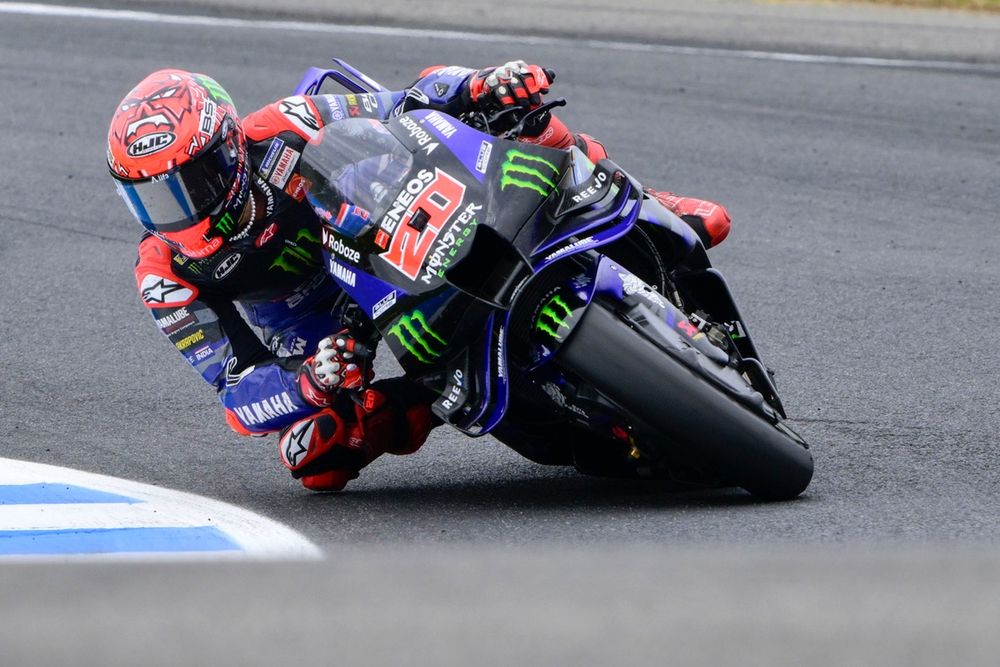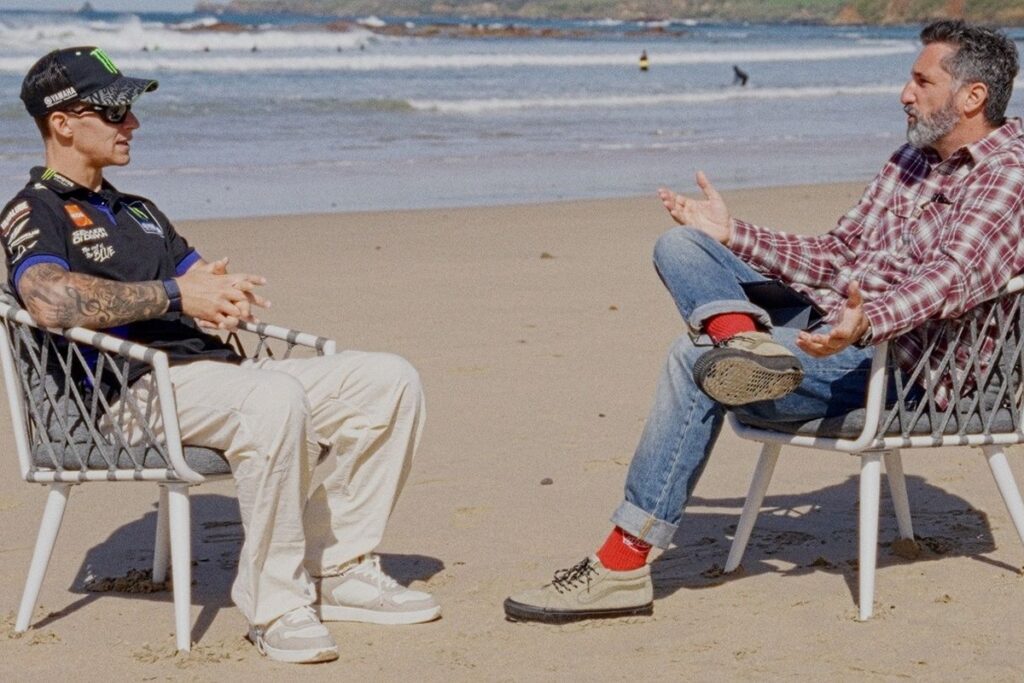Autosport caught up with MotoGP star Fabio Quartararo for an open and revealing conversation in the stunning setting of Phillip Island. The Yamaha rider appeared relaxed as he strolled along Smiths Beach, just beside the circuit, after spending a week on the Gold Coast soaking up the local lifestyle – early mornings, training, good food, and resting when the sun goes down.
Despite years of battling with a Yamaha he finds increasingly difficult to trust, Quartararo seemed calm as he discussed his future beyond 2026 – perhaps the most worrying sign yet for the Japanese brand.
Q: You arrived in MotoGP in a rather unexpected way. Is there anything you miss about that more anonymous version of yourself?
Fabio Quartararo: “Not really. My arrival in MotoGP was a bit improvised. Petronas was looking for a rider, and there were many candidates. But I managed to do the two best races of my life in Moto2, and that’s what gave me the chance to make the jump.”
Q: Thanks to that opportunity, your life changed completely. Do you ever think about what might have happened if it hadn’t come along?
FQ: That was my second year in Moto2, and I was getting faster every time. Maybe the following season I could’ve been more competitive, but you never know. When you get the chance to move up to MotoGP, you have to go for it. The following year the Triumph engine came in, and maybe I wouldn’t have adapted so quickly.”
Q: Has your inner circle changed much? Do you still keep in touch with childhood or school friends?
FQ: “I don’t really have school friends because I barely went to school, and at 14 I moved to Alicante with my manager at the time. That made me mature faster. My best friend is five years older than me, and I’ve always surrounded myself with older people. Since being in MotoGP, I’ve learned to tighten my circle. When you start getting good results, winning money and all that, lots of new friends appear. I’m very clear about who loves me for who I am, not for what I have.”
Q: Judging by your social media, it’s clear you care a lot about your loved ones. You’re still young – 26 years old. Is starting a family part of your future plans?
FQ: “I’m very family-oriented, probably because I don’t see my family often. And yes, I definitely want to start a family, but without forcing it. When the right person comes along, that will be the right time. It’s not a matter of age – if it happens tomorrow, great; if not, I’ll wait for the right moment.”
Fabio Quartararo, Yamaha Factory Racing
Photo by: Gold and Goose Photography / LAT Images / via Getty Images
Q: Yamaha gave you the opportunity to debut in MotoGP. How much did that weigh on your decision to renew your contract?
FQ: “In 2022 I was very close to leaving Yamaha. But I’d just won the title in 2021 and was leading the championship, so I stayed. Then I renewed until 2026 because I trusted what I saw about the bike’s development and what I thought would happen this year. It didn’t go as expected – we haven’t improved. Hopefully the 2026 bike will be better. More than feeling indebted, it was about weighing pros and cons. Giving Yamaha these two years was clearly their last chance. I’ll admit there was also a bit of ego involved – I wanted to get back to the top with this bike.”
Q: We’ve had this conversation before, and unfortunately for both sides, not much has changed in a year. What does Yamaha need to do to keep you?
FQ: “They need to find a solution.”
Q: Is there still time for that?
FQ: “There’s very little time. What Yamaha hasn’t managed to achieve in years, I hope they can do in a few months. Because I don’t have much time either — that’s clear. I don’t have much time to fulfil my dreams.”
Q: The rider market opens earlier and earlier each year. Is it already moving?
FQ: “More than moving, I’m thinking internally about what I want, what I’d be willing to do. But it’s still early to talk about that future. The thing is, as you say, the market starts moving earlier every year – I can’t afford to sleep on it.”
Q: Some riders, not only in MotoGP, say they’d be at peace with what they’ve achieved if they retired now – like Marc Marquez or Fernando Alonso. If you retired today, would you feel satisfied or have unfinished business?
FQ: “I’d have a lot left to do. I’m happy because my biggest dream was to be a MotoGP rider and win a world title – and I’ve done that. But I’m not satisfied with what I’ve achieved compared to the potential I have now. I know I’m much better now than in 2021 when I was champion. After three tough years, I’ve learned a lot about fighting without the right bike. I’m a winner, and I know what I still need to achieve before I retire and feel fulfilled.
Q: It’s clear that every time you’ve had the chance to show your talent, you’ve done it. Compared with the other Yamaha riders, have you felt like you’ve been pulling the team on your own?
FQ: “Not exactly alone, but over one lap I’ve been able to extract much more. That’s always been my strength since my first MotoGP season. In many qualifying sessions I finished third or fifth, and I know exactly where I lose time — whether it’s the engine, grip, or things that aren’t in my control. In races, I always give everything. We saw Alex in Indonesia running second, but what matters is how it ends. We already knew with that tyre we couldn’t push more.”

Fabio Quartararo, Yamaha Factory Racing
Photo by: Gold and Goose Photography / LAT Images / via Getty Images
Q: How has the management and communication changed within Yamaha with Lin Jarvis being replaced by Paolo Pavesio?
FQ: “I don’t talk much with Paolo. For me, the people who matter are the ones in the garage. I speak more with the engineers. When I visited the Formula 1 paddock, I saw things we weren’t taking advantage of. We had a meeting, changed some systems, and I think it’s gone quite well.”
Q: Without asking for confidential details, were those operational or technical matters?
FQ: “No problem – I can explain. It was really about increasing the amount of information available to the rider, which in Formula 1 is much greater. For example, about tyres. We know we don’t have the potential to fight for wins, but if we can finish fifth instead of eighth, we have to go for it. And to do that, I need as much information as possible – where I can push, where I have to watch tyre temperature, and so on. That’s something we didn’t do before and still need to improve.”
Q: You mean race management during the race itself?
FQ: “Exactly. Having a report about how the soft and hard tyres behave – where I can push more or less. I didn’t know that before, and we’ve improved from May until now.”
Q: Do you receive any of that information during the race?
FQ: “It’s more something I get before the race. For example, in Indonesia, I already knew I couldn’t push like Alex [Rins] was doing. If I had, we might have been second and third at one point, but we would’ve finished ninth and 10th. I preferred to stay where I was and finish better. In the past, I probably would’ve done the same as Alex – and ended up just as far back.”
Q: Has Yamaha implemented that approach for the other side of the garage as well?
FQ: “I gave them the idea. Then it’s up to the bosses to decide if it’s useful – I think they’re applying it to the other riders now.”
Q: What do you make of what Marc Marquez has done – not just winning again so dominantly, but doubting himself, giving up a lucrative final year at Honda to join a satellite team, and coming back the way he did?
FQ: “In Marc’s last year at Honda, it was already clear that the bike mattered too much and he didn’t want to hurt himself anymore. I saw a documentary about Sachsenring, where he’d won eight times in a row but couldn’t even finish because of crashes. For me, what he’s done is an example. In two years he’s gone from doing nothing because of the bike to winning races last season, and now taking the 2025 title comfortably. As a rider and as a person, it’s spectacular.”
Marc Marquez, Ducati Team, Fabio Quartararo, Yamaha Factory Racing
Photo by: Gold and Goose Photography / LAT Images / via Getty Images
Q: Two years ago, you probably didn’t have the financial cushion you have now. Doesn’t Marquez’s example inspire you to try something new?
FQ: “People talked a lot about my current contract for 2025 and 2026, but the numbers from the previous two years weren’t far off. I didn’t stay at Yamaha just for money. Marc left Honda when all the other factory teams already had their riders under contract. But yes, his example – going for the best bike regardless of money – is definitely inspiring.”
Q: What have riders noticed so far with Liberty Media’s arrival in MotoGP?
FQ: “So far, mostly things that work against us. We haven’t noticed many positives yet. Like being on the front row in Indonesia, zipped up in 50-degree heat.”
Q: Will you try to push for adjustments to those protocols?
FQ: “At some races it’s fine – like here in Australia, wearing the leathers zipped up isn’t a problem because it’s comfortable. But they should think about what a rider feels for 40 minutes with all the heat from the bike. Maybe they could tweak the plan a bit. It would be good if they thought more about the riders. It’s also about the number of people in the paddock – you don’t see that in Formula 1. It should be more exclusive. In F2 and F3, they’re kept separate. That should change.”
Q: A year ago you decided to change your management set-up – you left your agent and teamed up with Tom, your friend and assistant at races. Does it feel risky facing the upcoming rider market like that?
FQ: “We’re like hyenas – nothing escapes us! When we did it, we had to negotiate the 2024 contracts, so we already have experience. I value the trust I have in him more than his experience. I know what he’s capable of and what he’ll do. So I have no doubt he’ll choose the best option.”
We want to hear from you!
Let us know what you would like to see from us in the future.
Take our survey
– The Autosport.com Team
Read the full article here

